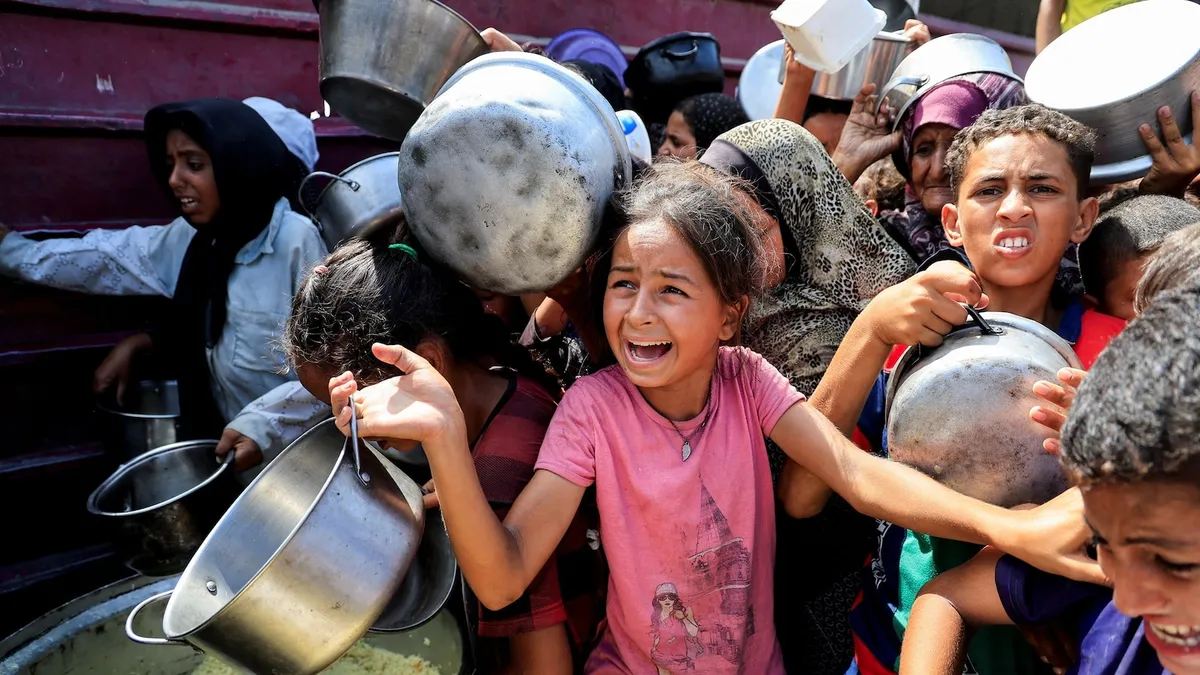
According to a warning issued on Friday by the Integrated Food Security Phase Classification (IPC), famine conditions have been confirmed in the Gaza Governorate, home to Gaza City. The IPC, a global initiative dedicated to monitoring hunger backed by governments, the United Nations, and non-governmental organizations, has projected that famine will likely spread to the Deir al-Balah Governorate in central Gaza and Khan Younis Governorate in southern Gaza by the end of September.
While the IPC does not officially declare famines, its findings are critical in guiding governments and organizations like the U.N. towards making such declarations. In response to the IPC report, COGAT, the Israeli defense body responsible for coordinating aid to Gaza, firmly rejected claims of famine in the Gaza Strip, particularly in Gaza City. They argue that the IPC report relies on partial and unreliable sources, many of which are reportedly affiliated with Hamas.
The IPC report highlights that over half a million people in the Gaza Strip are experiencing Phase 5 conditions, which are categorized as catastrophic levels of food insecurity. Additionally, approximately 1.07 million individuals, representing 54% of the population, face Phase 4 conditions, defined as emergency levels of food insecurity. The report estimates that by the end of September, nearly 641,000 people could be facing Phase 5 catastrophic conditions, with the number of those in emergency situations likely rising to 1.14 million.
Notably, the IPC report indicates that the figures may be an underestimate due to difficulties in assessing North Gaza and excluding the largely uninhabited Rafah area in southern Gaza. The Israeli Prime Minister's Office has labeled the IPC's declaration of famine as an "outright lie" and a “modern blood libel,” asserting that Israel will continue to facilitate aid to Gaza's civilians while countering Hamas's operations.
The food crisis in Gaza has significantly deteriorated following the cessation of the ceasefire between Israel and Hamas in March, which led to a blockade on aid entering the region. Reports indicate a rising number of deaths attributed to malnutrition, alongside distressing images of suffering children and long queues for food supplies. The Israeli authorities implemented an 11-week blockade from mid-March to late May to pressure Hamas into releasing hostages taken during its surprise attack on October 7, 2023.
International aid workers and medical professionals have reported critical shortages of water, food, and medical supplies, prompting the formation of the Gaza Humanitarian Foundation, which aims to streamline aid distribution. However, reports of violence against individuals seeking aid and the chaotic conditions at distribution sites have raised concerns about the effectiveness of these efforts.
Under increasing international scrutiny, the Israel Defense Forces (IDF) have started coordinating humanitarian air drops in Gaza with countries such as Jordan. Despite this, humanitarian organizations like Médecins Sans Frontières (Doctors Without Borders) have criticized the air drops as both ineffective and perilous. The IPC report warns that by June 2026, at least 132,000 children under the age of five could be at risk of death due to acute malnutrition, marking a significant increase from previous estimates.
U.N. aid chief Tom Fletcher, during a press briefing in Geneva, called the famine situation a "moment of collective shame," emphasizing that the international community must reflect on its role in the crisis. Similarly, Tjada D'Oyen McKenna, CEO of MercyCorps, expressed that the confirmation of famine is "absolutely horrifying yet not surprising," attributing the situation to preventable circumstances. She noted that Mercy Corps has essential aid waiting at the Gaza border, sufficient to assist 160,000 people, yet access remains blocked.
Israeli officials maintain that there are ample truckloads of aid at the border waiting for the U.N. to distribute. However, the U.N. has asserted that it cannot safely deliver the aid. In a recent statement, Israeli Prime Minister Benjamin Netanyahu vehemently denied accusations of a starvation campaign in Gaza, asserting that no such policy exists.
Furthermore, a USAID analysis has challenged claims regarding Hamas's diversion of humanitarian aid, revealing insufficient evidence of widespread theft that would account for the extensive hunger in Gaza. The report indicates that many instances of lost aid could not definitively identify the responsible party.
The unfolding humanitarian crisis in Gaza calls for urgent international attention and action. As the situation escalates, the necessity for unimpeded humanitarian aid, safety for aid workers, and restoration of essential services becomes increasingly critical. The world knows how to prevent famine; now it must act decisively to save lives in Gaza.